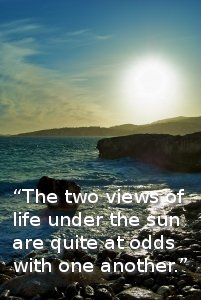Archived - The Viewpoint of Ecclesiastes: Cynicism or Realism?
 From Faith Pulpit, Winter 2012. Used by permission. All rights reserved.
From Faith Pulpit, Winter 2012. Used by permission. All rights reserved.
Qoheleth, the author of Ecclesiastes,1 looked at the various areas of life and concluded that everything was vanity.2 He started (1:2) and ended (12:8) his writing by stating, “vanity of vanities, all is vanity.” Is vanity, however, the theological message of Ecclesiastes? Or should it be understood in a more positive light? Gordon Fee and Douglas Stuart, co-authors of How to Read the Bible for All Its Worth, take differing views: “[one of us] understands Ecclesiastes to be an expression of cynical wisdom, which serves as a kind of ‘foil’ regarding an outlook on life that should be avoided; [the other one of us] understands the book more positively, as an expression of how one should enjoy life under God in a world in which all die in the end.”3 So is Ecclesiastes a warning to us of the vanity of life outside of a relationship with God or a message of how one can enjoy life despite its vanity?
Qoheleth, the Foil
Those who understand Ecclesiastes to be a foil (i.e., a contrast to the rest of the Bible’s teachings) interpret the majority of the book as “a brilliant, artful argument for the way one would look at life—if God did not play a direct, intervening role in life and if there were no life after death.”4 Ecclesiastes 12:13 and 14 is then understood as “a corrective, orthodox warning.”5 “Let us hear the conclusion of the whole matter: Fear God and keep His commandments, for this is the whole duty of man. For God will bring every work into judgment, including every secret thing, whether it is good or whether it is evil.”
 Read
Read  This article originally appeared at SI July 7, ‘06.
This article originally appeared at SI July 7, ‘06.
Discussion